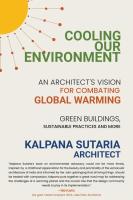Description
Buildings are places for comfort and joy. Buildings account for more than 40 percent of all emissions and have a huge impact on our environment. Professionals in the building industry are implementing sustainable building practices to create green buildings and infrastructure to lower emissions. But for cooling our environment, we need to learn about the root causes of global warming.
All our activities continue to warm the planet. Extreme weather events are on the rise and heat related deaths and illnesses are going up. We witness such weather routinely. What shall we do? Personal actions are not enough but they are motivators for bigger actions. For that, we must reach out to our lawmakers for policies that would help us transition towards clean energy research, development and deployment. Let us focus on thoughtful policies to create a livable world for all.
"Kalpana Sutaria's book on environmental advocacy could not be more timely. Inspired by a childhood appreciation for the beauty and practicality of the vernacular architecture of India and informed by her Jain upbringing that all living things should be treated with compassion, Kalpana puts together a great road map for addressing the challenges of a warming planet and the crucial role that the design community needs to play in its implementation." - Ted Flato, LAKE FLATO ARCHITECTS
"An Architect's Vision to Combat Global Warming by Kalpana Sutaria: Cooling our Environment: An Architect's Vision to Combat Global Warming by Kalpana Sutaria is a timely and insightful exploration of how the architecture and building industries can play a critical role in addressing the global climate crisis. With over 40% of all emissions coming from buildings, Sutaria argues that the way we design, construct, and operate buildings has a profound effect on both the environment and human health. But rather than simply presenting this problem, Sutaria offers a clear vision for how we can create a more sustainable and livable world through thoughtful design and proactive policies. The book is not just a critique of current practices but a call to action." - Charnjit Gill, author of Pray Tell
Product Details
- Dec 10, 2024 Pub Date:
- 9798891325418 ISBN-10:
- 9798891325418 ISBN-13:
- English Language




